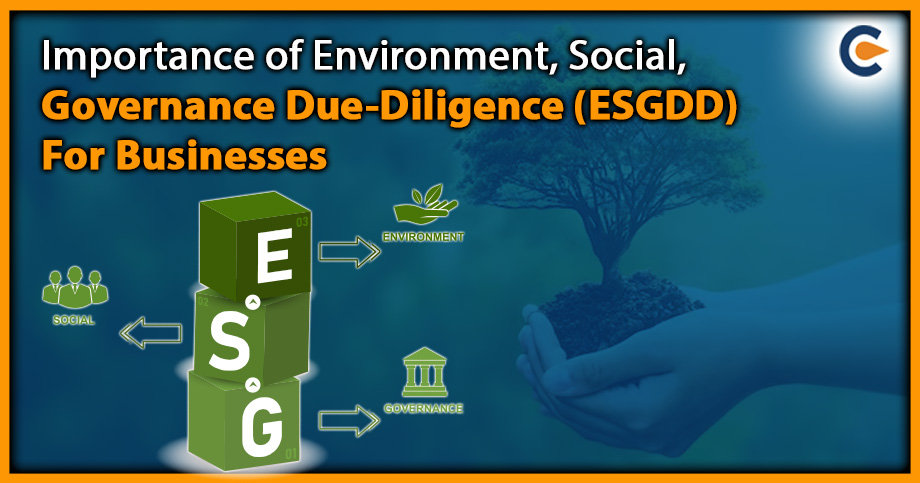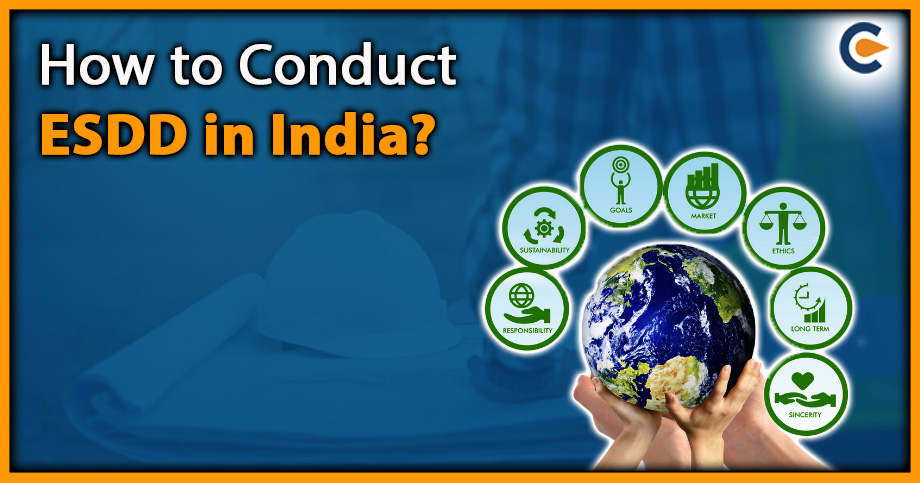Environment, Social, Governance Due-Diligence (ESGDD) refers to the process of recognizing and addressing environmental, social, and governance risks. The concept of “ESGDD” was introduced to aid investors in identifying potential ESG-related dangers in companies to promote sustainability. A company’s ESG profile can vary from substandard to exceptional depending on how well it meets global labour and human rights requirements, anti-corruption compliance, environmental protection, and responsible use of natural resources. Businesses that score poorly in these areas will likely experience higher costs and lower returns. As a result, they generate less value for their stakeholders, including shareholders, which may result in missed opportunities or even bankruptcy during market volatility or when demand for their goods or services declines.
Importance of Environment, Social, Governance Due-Diligence (ESGDD)
The importance of ESGDD is as follows:
- Identifying And Mitigating Risks – ESG due diligence helps identify and mitigate risks that may impact investor returns or improve the company’s ESG profile.
- Promotes Sustainability – Sustainability is a crucial factor for investors and shareholders to create sustainable returns over the long term.
- Helps in Monitoring – Ongoing monitoring is necessary to reduce public exposure to ESG risks and enhance company performance.
- Focuses On Long-Term Goals – ESG combines financial performance, environmental responsibility, and social responsibility, making it crucial for long-term value creation.
- Helps In Revenue Generation – A company’s ability to increase sales and profits relies on its capabilities in every aspect of the business, including environmental, social, and governance policies.
Regulations governing Environment, Social, Governance Due-Diligence (ESGDD)
The regulations are as follows:
- SEBI Regulations: Listed companies must disclose their ESG policies and efforts to address ESG issues. The top 1,000 listed companies must also inform their Business Responsibility Reports (BRRs) from 2019-20 onwards.
- Companies Act, 2013: Companies with a certain net worth, turnover, or net profit must spend at least 2% of their average net profits from the preceding three years on Corporate Social Responsibility (CSR) activities and disclose them in their annual reports.
- Environment Impact Assessment Notification, 2006: Companies must conduct an EIA study before starting any projects that could have a significant environmental impact, assessing the potential impact on various environmental parameters.
- Other Regulatory Frameworks: Companies can voluntarily adopt various guidelines and standards, such as the GRI standards, TCFD recommendations, UN SDGs, and ISO 14001[1] standard, to demonstrate their commitment to sustainability and enhance their brand reputation.
Management practice of Environment, Social, Governance Due-Diligence (ESGDD)
The Management Practice Is As Follows:
- Companies use diverse strategies to manage their ESG risk, which vary based on industry and culture.
- Some companies adopt the following practices to manage ESG risk: monitoring ESG impact through data collection, preparing annual sustainability reports, implementing processes and procedures with suppliers and customers to maintain relationships while preserving the environment and human rights, ensuring compliance with regulations and laws, and introducing programs for continuous improvement in ESG profile.
- Identifying an ESG risk requires a case-by-case approach because no two companies are identical, and there is no single effective method.
- Sustainable practices are not a one-time event but an ongoing process that requires continuous improvement and attention.
PE Diligence related to Environment, Social, Governance Due-Diligence (ESGDD)
Private equity due diligence identifies and addresses potential environmental, social, and governance (ESG) risks. This scrutiny ensures that private equity investments are socially responsible and in line with overall ESG goals.


Process to conduct Environment, Social, Governance Due-Diligence (ESGDD)
The process of ESGDD is depicted in the table below:
| Stage | Process | Description |
| Pre-Due Diligence | Scoping | Define the scope of the ESGDD process and identify the key ESG risks and opportunities that are relevant to the transaction. |
| Stakeholder engagement | Engage with internal and external stakeholders to understand their perspectives on the transaction and the potential ESG risks and opportunities. | |
| Materiality assessment | Conduct a materiality assessment to identify the most significant ESG issues that could affect the transaction. | |
| Risk assessment | Assess the ESG risks associated with the transaction, including environmental, social, and governance risks, and their potential impact on the transaction. | |
| Due Diligence | Data collection | Collect data on the identified ESG risks and opportunities using publicly available information, site visits, and interviews with key stakeholders. |
| Risk analysis | Analyze the data to evaluate the significance and potential impact of the identified ESG risks and opportunities on the transaction. | |
| Mitigation strategy development | Develop a mitigation strategy for the identified ESG risks and opportunities, including risk reduction, transfer, or acceptance. | |
| Valuation | Assess the financial impact of the ESG risks and opportunities on the transaction, including any costs associated with mitigating the risks. | |
| Reporting | Prepare a report summarising the ESGDD findings, including the identified ESG risks and opportunities, the mitigation strategy, and the financial impact of the risks and opportunities on the transaction. | |
| Post-Due Diligence | Monitoring | Establish a monitoring program to track the implementation of the mitigation strategy and ensure that the identified ESG risks and opportunities are managed effectively. |
| Reporting | Develop a reporting framework to communicate the ESG performance of the transaction to internal and external stakeholders, including investors, regulators, and customers. |
Benefits of Environment, Social, Governance Due-Diligence (ESGDD)
The benefits of ESGDD are as follows:
- Mitigating Long-Term Risk: by identifying and addressing ESG risks, companies can reduce the likelihood of future financial, legal, or reputational damage.
- Improving Operational Efficiencies: ESGDD can help companies identify areas for improvement in their operations and supply chain, leading to cost savings and increased efficiency.
- Attracting and Retaining Talent: Younger generations of employees often prioritize working for companies that prioritize sustainability and social responsibility, making ESG due diligence important for attracting and retaining top talent.
- Creating New Opportunities: By identifying emerging ESG trends and issues, companies can create new business opportunities and revenue streams.
- Improving Brand Reputation: Companies with a strong ESG profile often have a better reputation among customers, investors, and other stakeholders, which can translate into increased brand value.
- Higher ROI on Private Equity Exits: Private equity firms that conduct ESGDD on their portfolio companies can potentially increase the return on investment when they leave those companies by improving their ESG profile and reputation.
Documents Required To Conduct ESGDD
The documents required are as follows:
- Basic Information About The Company – Registration documents, organizational structure, board of directors, management team, and business operations.
- Financial Data – Audited financial statements, tax returns, and bank statements.
- Important Business Agreements – Customer contracts, supplier contracts, lease agreements, joint venture agreements, etc.
- Intellectual Property patents, trademarks, copyrights.
- Litigation Aspects – Pending legal cases, regulatory actions, enforcement proceedings.
- Marketing Information – Marketing strategies, advertising campaigns, and market research reports.
- Internal Control Check System – Policies and procedures, risk management framework, internal audit reports.
- Taxation Aspects – Tax compliance status, tax planning strategies, tax liabilities.
- Insurance Coverage – Insurance policies, coverage limits, claims history.
- Environmental Aspects include environmental impact assessments, pollution control measures, and environmental compliance with environmental laws and regulations.
- Human Resource Aspects – Employee contracts, training programs, diversity and inclusion policies, labour union agreement.
- Cultural Aspects – Corporate culture, ethics and values, stakeholder engagement initiatives, community outreach programs.
Conclusion
Environment, Social, Governance Due-Diligence (ESGDD) is a process that helps investors, companies, and other stakeholders assess the potential ESG risks and opportunities associated with a particular investment or transaction. ESGDD enables companies to identify and manage potential risks and opportunities related to environmental impact, social responsibility, and corporate governance practices. It is highly recommended to take advice from experts in conducting due diligence for companies and projects to avoid any issues arising later on and to work and address those issues.
Read Our Article: New Amendment Under Section 49 Of The Legal Metrology Act, 2009











